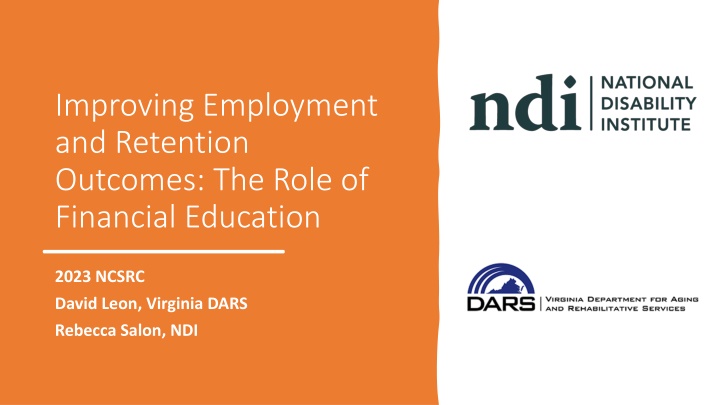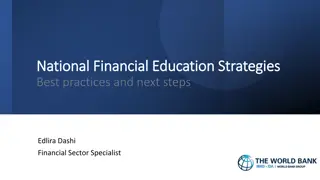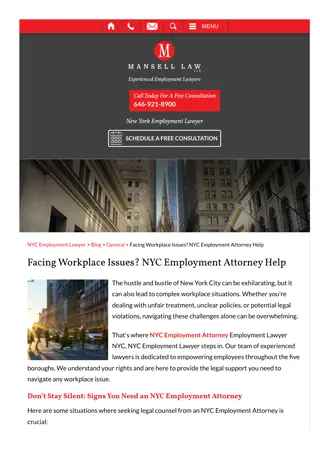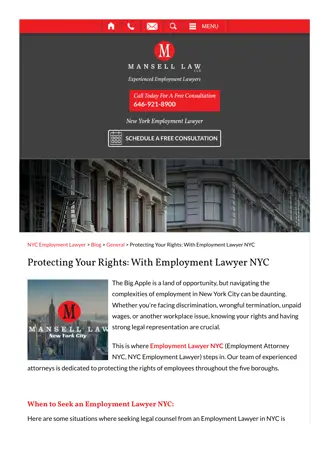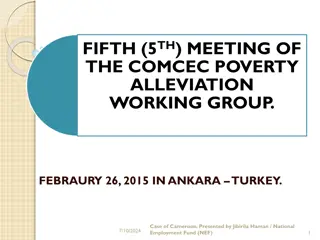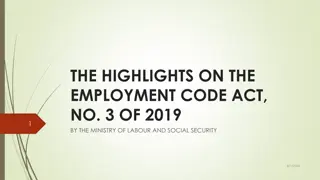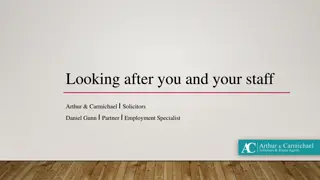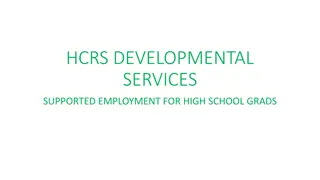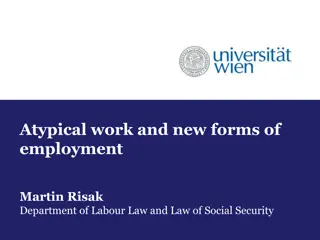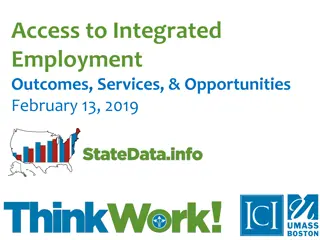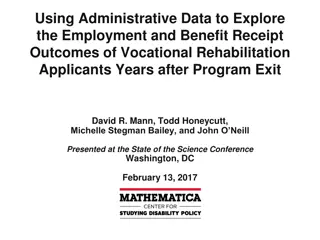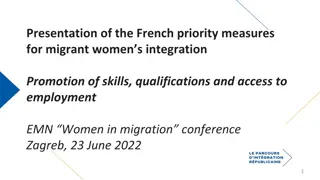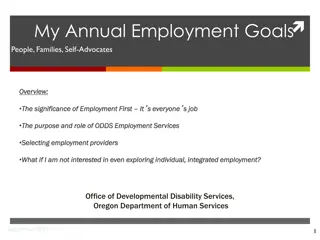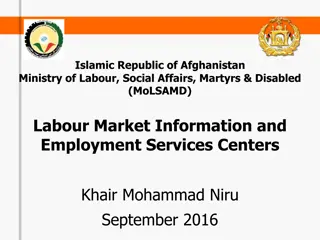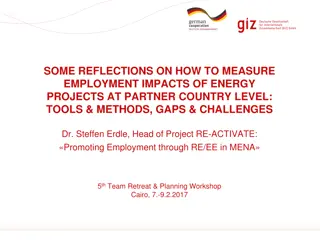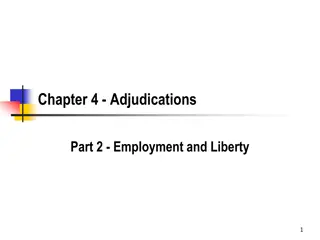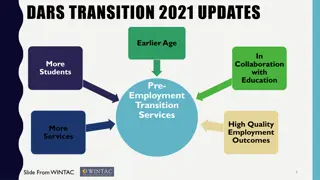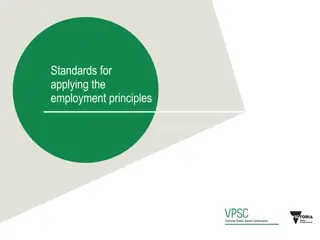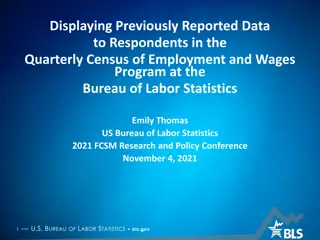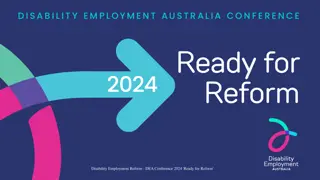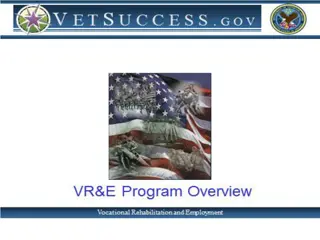Role of Financial Education in Promoting Employment Outcomes
This project aims to enhance employment and community participation among young adults with disabilities by incorporating financial education, coaching, and goal planning. It focuses on building trust with clients, integrating positive psychology, benefits planning, and inclusive program components.
Download Presentation

Please find below an Image/Link to download the presentation.
The content on the website is provided AS IS for your information and personal use only. It may not be sold, licensed, or shared on other websites without obtaining consent from the author.If you encounter any issues during the download, it is possible that the publisher has removed the file from their server.
You are allowed to download the files provided on this website for personal or commercial use, subject to the condition that they are used lawfully. All files are the property of their respective owners.
The content on the website is provided AS IS for your information and personal use only. It may not be sold, licensed, or shared on other websites without obtaining consent from the author.
E N D
Presentation Transcript
Improving Employment and Retention Outcomes: The Role of Financial Education 2023 NCSRC David Leon, Virginia DARS Rebecca Salon, NDI
Objectives for the session This session will: (1) Describe the role of financial education, coaching and goal planning in promoting employment outcomes and community inclusion. (2) Explore strategies for building trust with clients and their families when introducing financial capability supports and services, including benefits planning. (3) Identify the possible components of programs that include financial education and counseling as part of service planning, job development and placement, including the role positive psychology can play in promoting employment and community participation outcomes.
Project Partners The Good Life CAF is a partnership between: Virginia DARS National Disability Institute Virginia s ABLEnow Program Research Team: Burton Blatt Institute (BBI) at Syracuse University
It is a project designed to improve the It is a project designed to improve the employment and community participation for employment and community participation for young adults (18 young adults (18- -24 years of age) with disabilities, 24 years of age) with disabilities, building on their current services from DARS. building on their current services from DARS. What is the Financial Engagement as a Gateway to Employment and Community Participation Project? The project includes and/or builds on services The project includes and/or builds on services and supports for: and supports for: Financial Capability Financial Capability Life Satisfaction & Quality of Life Life Satisfaction & Quality of Life Self Self- - Determination Determination Planning for the Future Planning for the Future Achieving a Better Life Experience (ABLE) Achieving a Better Life Experience (ABLE) Accounts Accounts
To participate, people must: To participate, people must: Be in ACTIVE STATUS with DARS with an Be in ACTIVE STATUS with DARS with an Individual Plan for Employment (IPE) Individual Plan for Employment (IPE) Have a qualifying disability Have a qualifying disability Be between the ages of 18 Be between the ages of 18- -24 24 Criteria to Participate Be receiving SSI, SSDI, or have dual Be receiving SSI, SSDI, or have dual eligibility eligibility Have access to a computer or smartphone, Have access to a computer or smartphone, along with internet access, so that they can along with internet access, so that they can participate in classes and coaching participate in classes and coaching sessions online sessions online Not currently have an ABLE account Not currently have an ABLE account
Why is Financial Empowerment Critical for Employment Success? We all know that job seekers with disabilities turn down jobs or limit their hours/opportunities because of benefits concerns, misinformation, or lack of a clear understanding about the financial impact of working No clear link between what people want out of life and working People may not have had experience handling finances so have no frame of reference Studies demonstrate a link between benefits counseling and higher earnings Financial empowerment may reduce recidivism in vocational rehabilitation
Components of Our Approach to Financial Empowerment Financial Health Assessment Asset Development, including ABLE accounts Goal Setting that Links Employment and Life Goals to Financial Goals Accessible Financial Literacy Content Flexible Delivery of Content to Address Individual Priorities for Each Person Coaching and Counseling, including Benefits Planning Resources and a Support Network
The Importance of Building Trust and Confidence re: Financial Literacy Acknowledging that most people feel uncomfortable talking to others about finances, and that no one has all the answers You don t have to be perfect yourself when it comes to managing finances or planning for the future to support others Regardless of your experiences, you still can establish trust and build rapport
We ask: How many of you have dreams about your future? Since you all are getting services from DARS, we know that one of your hopes and dreams is for a good job that you like. Who here wants a good job that you like? What other kinds of things do you dream about and hope for? How many of those things require money? How many of those things might require you to plan for the future? Do any of your dreams involve doing things in your communities? How do we get youth/young adults engaged?
The GoodLife CAF (COMMUNITY ACCESS AND FINANCIAL EMPOWERMENT)
All participants work with project staff who are trained in financial coaching. How the Project works Participants receive LifeCourse training, Financial Literacy Training, an ABLE Account and scheduled deposits into the ABLE Account Participants have scheduled contacts to update project staff on their progress and to receive additional coaching, as needed.
Charting the LifeCourse oTools and instruction designed to help job seekers conceptualize their goals in a new way by identifying and accessing supports o Personal Strengths & Assets o Relationships o Technology o Community Based Supports o Eligibility Specific Supports
Exploring Community Participation and Employment
Your Money Your Goals
Module 1: Setting Goals Module 2: Saving Module 3: Tracking Income and Benefits Module 4: Paying Bills Your Money Your Goals Module 5: Getting Through the Month Module 6: Dealing With Debt Module 7: Understanding Credit Reports and Scores Module 8: Choosing Financial Products and Services Module 9: Protecting Your Money
DARS Financial Health Assessment NextGen Personal Finance games, activities, lessons, videos, etc. Positive Psychology Exercises Other Components of Curriculum Public Broadcasting Service s Two Cents introductory financial literacy videos Select components of NDI s Financial Literacy Curricula And more
We Welcome Supporters! Supporters are family members, friends, support staff, and others invited to participate by someone accepted into the project. Supporters can offer assistance, as requested by a project participant, in any of the sessions and in the completion of activities, homework assignments, and surveys. They also can assist with online access for people who request support.
Resources Virginia Department for Aging and Rehabilitative Services Secure Your Financial Future: A Toolkit for People with Disabilities Aligning Employment and Financial Conversations in American Job Centers Aligning My Career Path with My Earning Needs LifeCourse Nexus Consumer Financial Protection Bureau Youth Money, Your Goals NextGen Personal Finance
FOR MORE INFORMATION David Leon, Director, Workforce Programs Virginia Department for Aging and Rehabilitative Services David.Leon@dars.virginia.gov Rebecca Salon, Principal Investigator & Senior Advisor National Disability Institute rsalon@ndi-inc.org
DISCLAIMER: This project is supported, in part, by grant number 90DPCP0003-01-01 from the National Institute on Disability, Independent Living, and Rehabilitation Research (NIDILRR), U.S. Department of Health and Human Services, Administration on Community Living, Washington, D.C. 20201. NIDILRR NIDILRR Disability Disability Research Research Project: Project: Community Community Living and Living and Participation Participation As a grantee, we are encouraged to freely express freely our findings and conclusions. Therefore, our points of view or opinions do not necessarily represent official ACL policy. 21
QUESTIONS? 22
